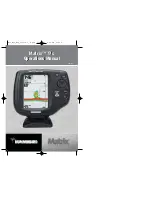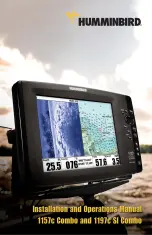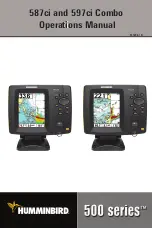
19
What’s on the Side Imaging® Display
Boat speed:
Side Imaging® is best performed at boat speeds between 2 to 6
mph. If the boat is stationary, the same information is displayed over and over.
If the boat is moving very quickly, there will be gaps between the strips of
information. The best boat speed to use will depend on the side range selected.
Slower speeds are good for longer ranges, while faster speeds can be used at
shorter ranges.
Boat navigation:
It is important to understand that when the boat turns,
successive beam strips to one side will begin to overlap and the strips on the
other side will fan out, providing some distortion to the image. Because of this,
the best imaging performance is produced by straight line navigation and
minimal side-to-side boat motion (i.e. wave induced, etc.). This applies to
navigation by either the main engine or the trolling motor. Minimize turning
time and avoid wave action that induces large side-to-side rocking of the boat.
For example, if there is a lot of wave activity, try to move the boat so that it is
perpendicular to the waves instead of parallel with the waves in order to
minimize the side-to-side rocking of the boat.
Beam coverage:
When there is an area directly under the boat that does not
have SI beam coverage, this area will be covered by the standard 200/83 kHz
down-looking beam and displayed in the Sonar views. The net effect of this, on
the display, is that a single object may appear as two separate entities, when
in reality, it is one continuous object. See
Submerged Bridge: A Closer
Perspective
and the
Submerged Bridge: Alternative Perspective
illustrations for
examples of this.
See
humminbird.com
and
sideimaging.com
for a side imaging
sonar tutorial and additional information.

































